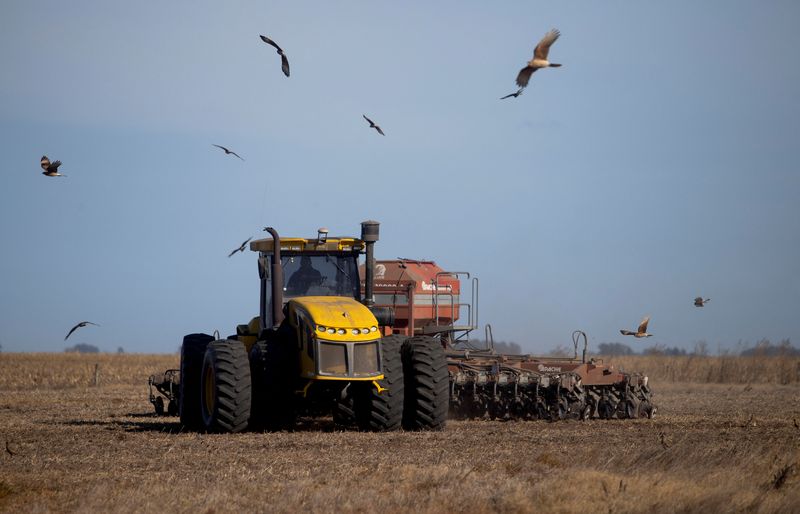By Julie Ingwersen
CHICAGO (Reuters) - Nearly all corn and soybean acres in the world's largest exporting countries are seeded with genetically modified varieties, but that is not the case for wheat, a crop grown primarily for human food.
Biotech varieties of corn and soy, used for animal feed, biofuels and ingredients like cooking oil, were introduced in 1996 and soon came to dominate plantings in the United States as well as Brazil and Argentina, the world's top suppliers.
But genetically modified wheat has never been grown for commercial purposes due to consumer fears that allergens or toxicities could emerge in a staple used worldwide for bread, pasta and pastries.
Now, growing concerns about a possible global food crisis being triggered by climate change and war in Ukraine may be chipping away at opposition.
Argentine biotech company Bioceres is shaking up the status quo by developing wheat genetically modified to better tolerate drought, positioning itself ahead of larger global companies that are still steering clear.
Brazil has become the second country in the world after Argentina to approve the cultivation of genetically modified wheat, after a request from a Bioceres partner.
Because wheat is traded in a global marketplace, the threat of trade disruptions due to GM fears can be significant, as U.S. and Canadian wheat growers know well.
Two decades ago, Monsanto (NYSE:MON) Co was working to commercialize wheat bred to withstand treatments of its weed-killer Roundup, but the company halted that effort in 2004. International buyers had threatened to boycott U.S. wheat if the product was introduced to the marketplace. Monsanto was purchased by Bayer AG (ETR:BAYGN) in 2018.
Monsanto's experimental wheat was supposed to have been destroyed or stored securely. However, small patches of Roundup-resistant wheat plants emerged years later in several U.S. states, including Oregon in 2013, Montana in 2014 and Washington in 2016 and 2019 as well as Canada's Alberta province in 2017.
The findings prompted importers, including Japan and South Korea, to suspend imports of North American wheat until they could confirm that no unapproved strains had entered commercial channels.
Attitudes toward genetically modified crops vary around the world. China, a top world buyer of soy and corn, allows GM crops in imported feed grains but only recently began to approve GM varieties for cultivation.
Germany, home to seed giants Bayer (OTC:BAYRY) and BASF, imports GM soy. But domestic opposition to biotech crops is strong enough that these companies conduct their crop research abroad.
Australia grows and exports GM cotton and canola, and the country in May approved Bioceres' biotech wheat for use in foods.
Mexico, among the largest buyers of U.S. corn, has said it will halt GM corn imports for human consumption, but walked back a deadline to ban the corn for animal feed.
In the United States, some producers and wheat industry leaders have expressed interest in using biotechnology to boost wheat's profitability and appeal to farmers.
In the quarter-century since genetically modified corn and soybeans were introduced, overall U.S. plantings of those crops expanded by 13% and 37%, respectively, while U.S. wheat plantings fell by 37%, hitting the lowest in more than 100 years in 2020, according to U.S. Department of Agriculture data.
The majority of biotech corn and soybean crops are modified for insect resistance and herbicide tolerance, traits that some wheat growers would like to access. Bioceres' drought-tolerant wheat, known as HB4, adds another element to the mix.

Recent disruptions to global wheat supplies have brought a new degree of urgency to the debate over biotech wheat.
Two trade groups, U.S. Wheat Associates and the National Association of Wheat Growers, support "the eventual commercialization" of biotech wheat, according to their websites, provided that plans are implemented to minimize market disruptions.